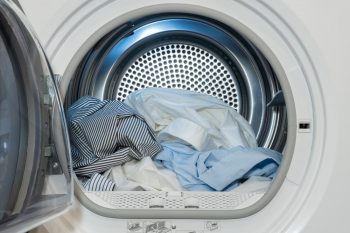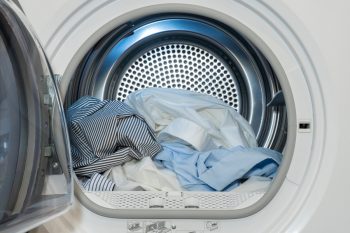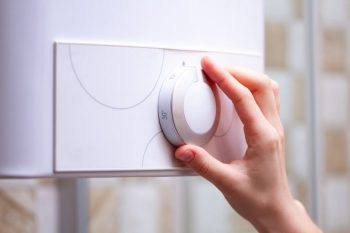
Are you worried about why your dishes taste like soap after washing them in a dishwasher? Do you often find your dishes slimy after a dishwasher wash cycle? Does your glassware appears opaque and not crystal clear, although it has been washed? There could be several reasons behind this atypical behavior of your dishwasher.
Tasting soap on the dishes can trouble you. This would indicate that the cleaning activity is being hindered and you feel nasty eating food in such dishes which appear to be not clean.
The reasons why your dishes taste like soap after being washed in the dishwasher can be as follows:
- Hard water problem
- Excessive use of dishwashing soap
- Low-quality dishwashing soap
- Problems with the drainage filter
- Clogged water line
- Wrong water temperature settings
- Unnecessary use of washing pods
This article will explain 7 of the most common reasons your dishes taste like soap after washing them in the dishwasher.
7 Reasons Why Dishes Taste Like Soap After Dishwasher
Suppose you just grabbed a freshly washed glass from your dishwasher and poured in water, and as soon as you take a sip, you feel nauseous. The reason is the taste of the water. It tastes less water and more detergent. Isn’t it disgusting?
To fix the problem, you will first have to identify its reason. If not fixed properly, your dishwasher will keep sprinkling soap over the dishes and present them to you without rinsing them off.
There can be several reasons behind this particular case. Sometimes, your dishwasher will require a good repair service or may want to be replaced by a new one.
Before putting your money into a new dishwasher, this article will help you figure out some easy fixations for the problem.
1. Hard Water Problem
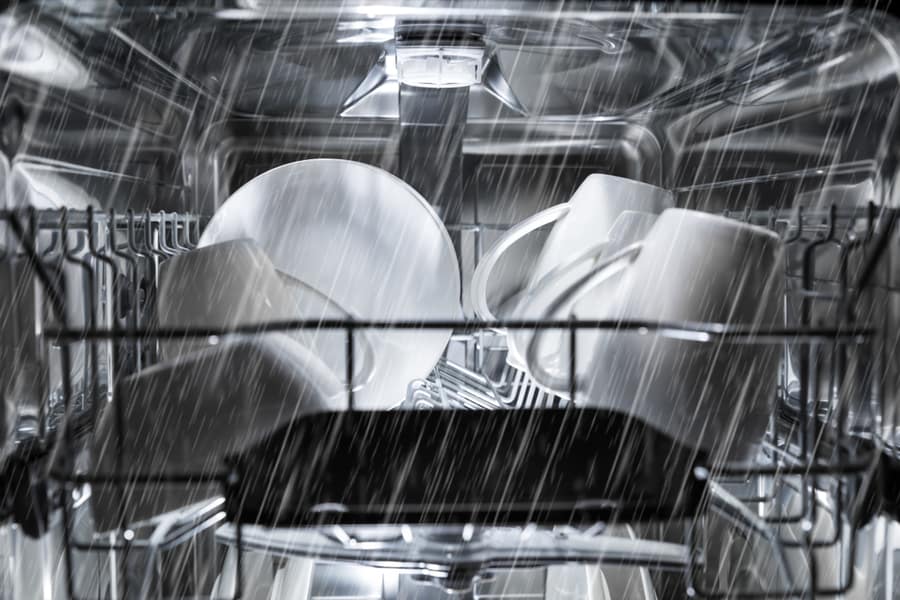
We all know how difficult hard water can make washing your clothes. But have you ever noticed your dishes after washing them under hard water? They encounter the same problem, i.e., not rinsing off the soap properly.
Hard water contains many minerals, such as calcium, magnesium, and other dissolvable salts. On the other hand, dishwashing soap contains stearic acid and its salt with sodium.
Instead of washing the dishes, dishwashing soap and hard water will produce a residue often known as scum.
This means the soap might stay resting on the dishes and not get cleaned properly. This can become a major problem making the dishwashing activity a big challenge for your dishwasher and you.
You can test your tap water in a laboratory to check its condition. If you find it hard water, you can take proper measures to treat it.
The very first solution is to install a water-cleaning filter in your home. Many dishwashers often come with an already attached filtration unit. You can easily check and turn it on if your dishwasher also has one.
The other solution is to apply a dishwasher descaler. This helps to remove limescale accumulation due to hard water problems. You will have to start the hot water wash cycle without adding detergent.
Instead of the dishwasher, you can add the descaler over the bottom. This will help treat the hard water and clean your dishes without being soapy.
Sometimes, soft water can also taste soapy. This has to do with its alkaline pH.
2. Excessive Use of Dishwashing Soap
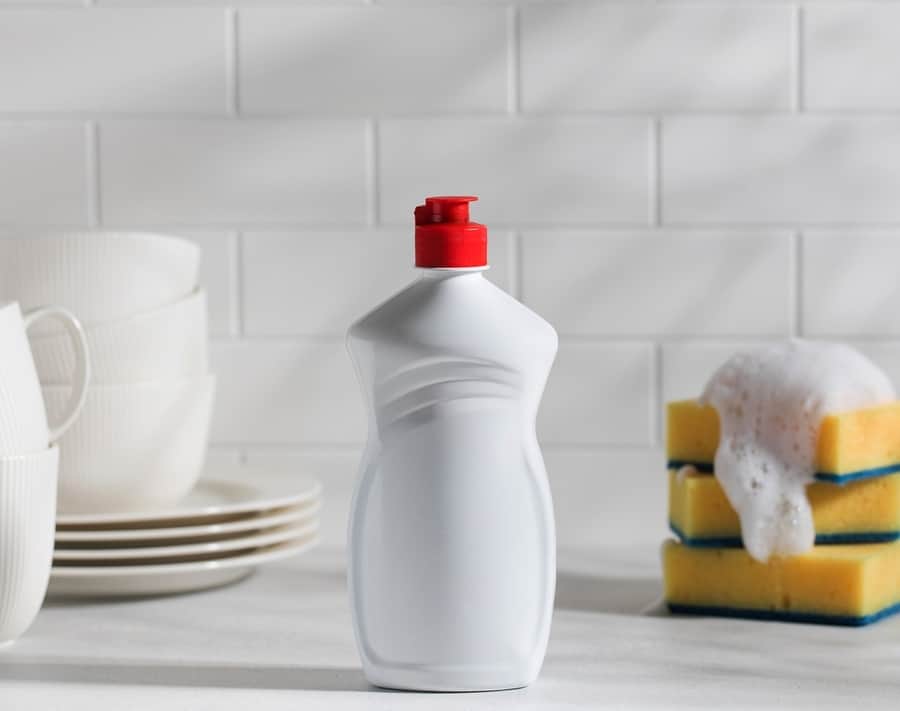
Adding a large amount of soap to the dishwasher will help clean dishes. If you think and do the same, you need to stop.
Most dishwashers have a built-in measuring cup. This helps add the right amount of dishwashing soap in the dishwasher and prevents additional from resting on the dishes.
You must use only a full cup of washing detergent if your dishwasher is fully loaded with dishes. If the load is less, you can also reduce the detergent accordingly.
The use of dishwashing pods is simple. It will prevent measurement problems and help you with exact soap amounts in its slots.
3. Low-Quality Dishwashing Soap
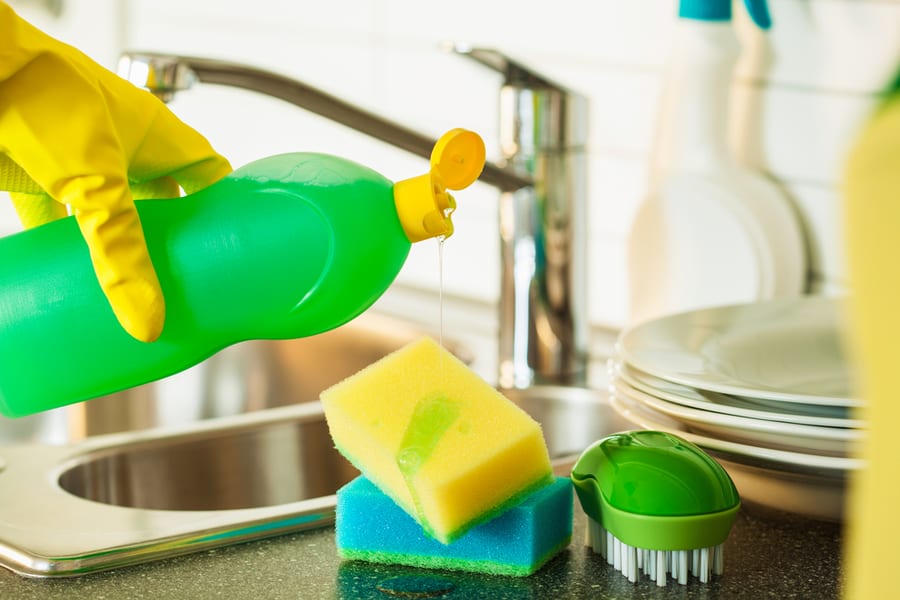
One factor that greatly affects the quality of dishes being washed is the low quality of dishwashing soap.
A cheap quality dishwashing soap will not clean your dishes properly. This will leave them unclean, cloudy, slimy, and soapy. Moreover, it will also keep the dishes from getting nicely dried in the heated dry cycle.
If you are doing the same, you must immediately shift your preference to a good quality soap. The difference will be jaw-dropping, and you will not think of returning.
A good quality dishwasher soap can not only wash the dishes but also give the following advantages:
(i) Cleaning Power
A good quality soap has better cleaning power and can remove any stubborn stain on the dishes.
(ii) Food Softening
A good quality dishwasher soap will soften the food residual on your dishes. This will help better rinse your dishes with no food particles still sitting on them and no buttery texture.
(iii) No Pre-Soaking
Usually, you need to pre-soak the dishes to clean them better. A good quality detergent escapes the need for pre-soaking and removes the dried food particles without pain.
(iv) Quick Dissolving
A good quality soap has a better-dissolving power. It means it will easily rinse off the dishes in the hot water spray cycle and prevent leaving its slimy residue on the dishes afterward.
4. Problems With the Drainage Filter
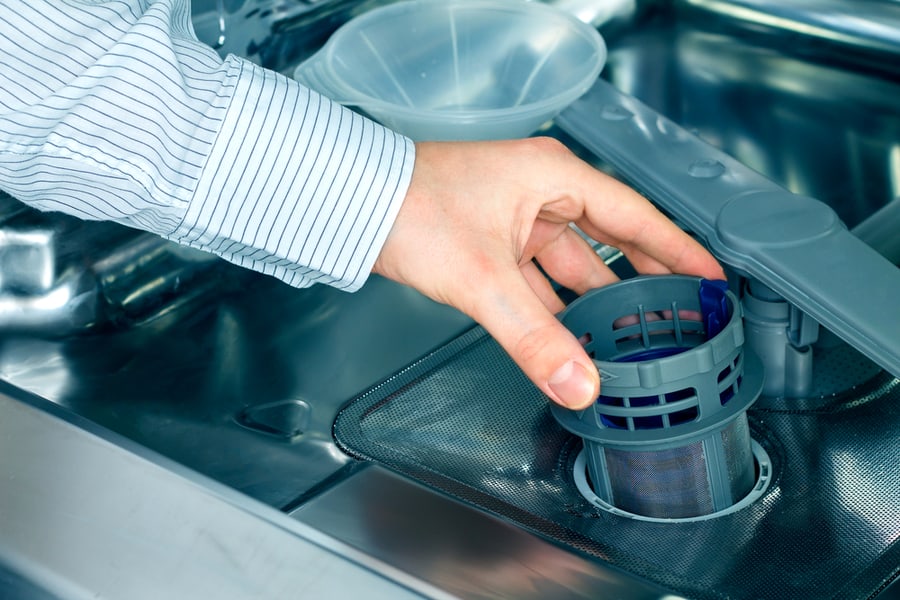
A drainage filter sieves the food particles from going into the draining system and blocking it. However, if it becomes clogged, it can cause the dirty water from the dishwasher to stay inside and sprinkle onto the dishes all over again.
Since it is soapy water, it will make your dishes slimy and soap-tasting again.
To prevent this problem, you will need to clean and unclog your drainage filter once every week to ensure the water is being easily discarded after cleaning the dishes.
You can use a toothbrush or a toothpick to open up the clogged pores. You can also leave it soaked in a detergent liquid to soften the stubborn residual.
You can also replace the filter with a new one if the previous one is severely damaged.
5. Clogged Water Line
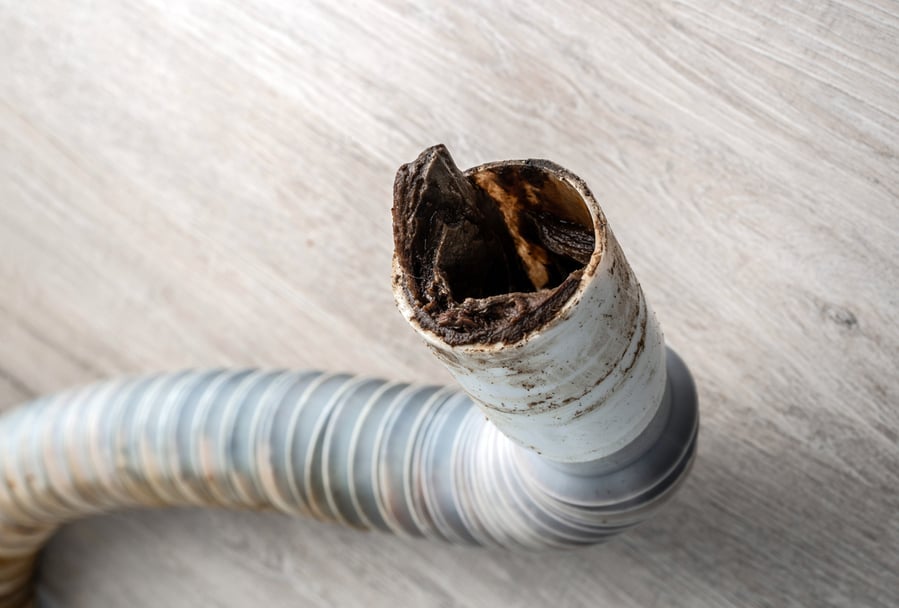
Any clogging of the water pipeline can also cause the problem of soapy slimy dishes. A clogged water line means your dishwasher will not empty or replace the soapy water with clean water.
This will cause a backflow of dirty water, leaving a soapy flavor on the dishes.
You can tightly seal and secure the water pipelines and the drainage line. Make sure not to bind them with too much force; otherwise, it can result in a massive leakage.
You can check the water inlet valve and replace it with a new one if required. Properly secure the valves and hoses into their right place. Fixing the drainage and water inlet pipes can help you correct the problem of soapy dishes.
6. Wrong Water Temperature Settings
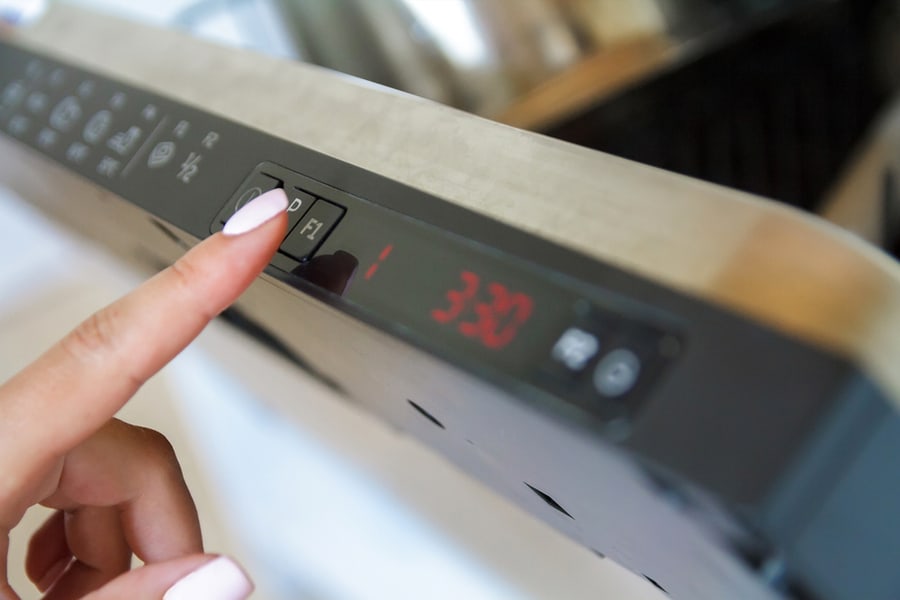
The temperature of the water when rinsing the dishes should be very hot to dissolve the residual soap and rinse it off.
Sometimes, a problem with the heating element can result in improper water heating. This will eventually affect the quality of the dishes being washed. To maximize the dishwashing quality, you must ensure the water is heated up to 150 degrees Fahrenheit.
First, set the right temperature for the dishwasher cycle. Secondly, check the heating element of the dishwasher. If it is faulty and not working properly, replace it as soon as possible.
7. Unnecessary Use of Washing Pods
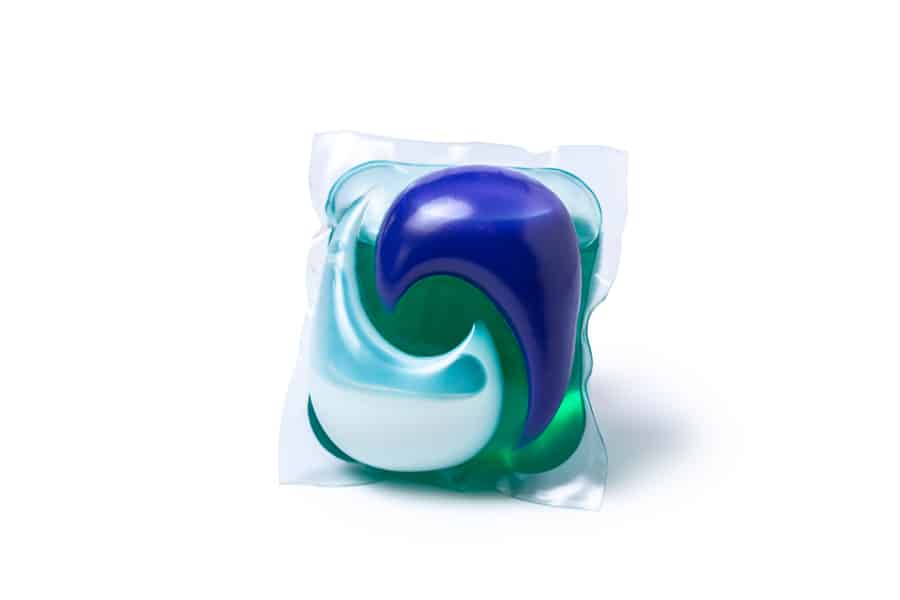
Dishwashing pods are a simple and convenient way to add the exact correct amount of dishwasher soap in the dishwasher. However, it will vary depending on the model of your dishwasher.
Many manufacturers do not recognize dishwashing pods as they are solid and often take too long to dissolve properly. Therefore, they may also leave a soapy aftereffect on the dishes after being washed.
You can switch to liquid or powder dishwashing soaps to avoid such problems. This can help prevent the build-up of buttery texture in the dishwasher and on your dishes.
Conclusion
There can be many reasons behind your dished tasting, like soap after a wash cycle in the dishwasher. The reason can be a problem of hard water at your place.
You might use too much or a very cheap detergent in your dishwasher. Soapy dishes can also indicate a problem with the water and drainage pipeline or a clogged filter.
You must also prefer dishwashing liquid over pods to wash your dishes for a better result. Make sure the water is hot enough to nicely remove all the soap residue from the dishes.
Frequently Asked Questions
Does Hard Water Cause Dishes to Taste Like Soap?
Because hard water can not dissolve the stains, it can react with the soap to create white precipitates, often known as scum.
The leftover mineral deposits on dishes can give them a soapy taste.
Which Detergent Is Best To Prevent Dishes From Tasting Like Soap?
To prevent your dishes from tasting like soap, you must use a detergent designed for dishwasher use. Moreover, you can also avoid dishwasher pods as they take more time to dissolve.
This can make dishes soapy and slimy even after a wash.

